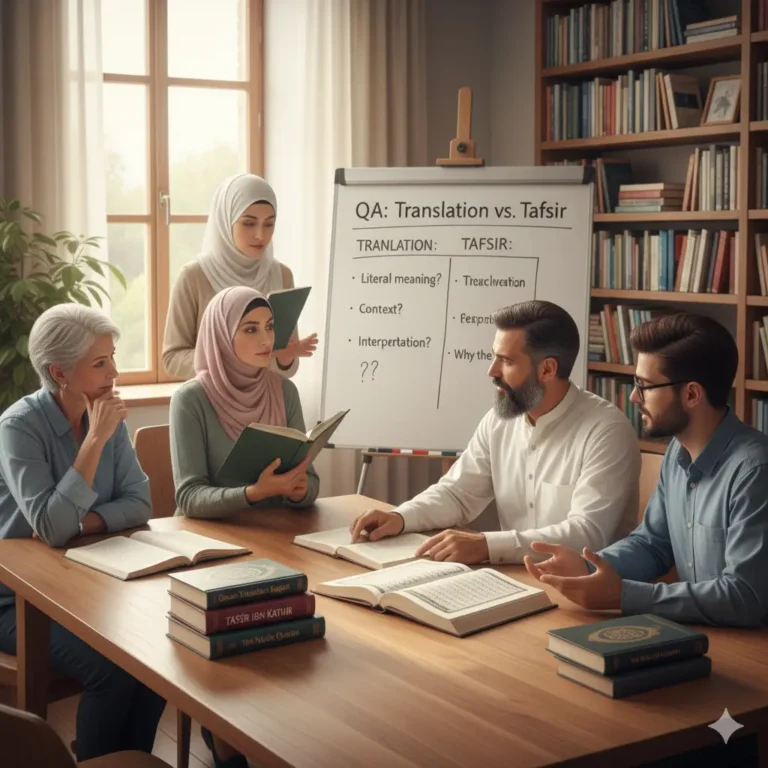The Quran is the divine book of guidance for Muslims across the world. However, understanding it deeply often requires clarification, especially when distinguishing between Quran Translation vs Tafsir. Many students, parents, and new learners ask: What is the difference? Which one should I study first?
This article is structured as a Q&A style guide to answer the most frequently asked questions on this important topic. We will also provide useful resources and online courses that can help you learn translation and tafsir with professional teachers.
For those seeking to study deeply, Quran for All School offers specialized programs such as Tafsir Quran Course and Quran Tajweed.
FAQ – Quran Translation vs Tafsir
Q1: What is the difference between Quran Translation and Tafsir?
- Translation is the process of rendering the meaning of the Quran into another language, making it accessible to non-Arabic speakers.
- Tafsir, on the other hand, goes much deeper. It explains the meanings of the Quran based on linguistic, historical, theological, and scholarly interpretations.
In short:
- Translation = word meaning
- Tafsir = context, explanation, and detailed understanding
Q2: Why is Tafsir more detailed than Translation?
Tafsir explores:
- The reasons for revelation (Asbab al-Nuzul)
- The opinions of scholars and Companions
- Language and grammar in classical Arabic
- Lessons and rulings derived from the verses
Translation cannot capture all these dimensions. For example, a single Arabic word may have multiple meanings, and tafsir clarifies which meaning applies in context.
Q3: Can I rely only on translation to understand the Quran?
While translations are useful for basic understanding, they are not enough for full comprehension. Without tafsir, one may miss critical context or even misinterpret a verse.
If you are a beginner, starting with translation is fine. But as you advance, enrolling in a structured course like the Tafsir Quran Course is highly recommended.
Q4: Which is easier to study – Translation or Tafsir?
- Translation is easier for beginners since it requires less background knowledge.
- Tafsir requires more time and effort because it involves scholarly commentary and deeper linguistic understanding.
For kids and beginners, courses like Quran Classes for Kids start with recitation and translation basics before moving into tafsir.
Q5: Is it necessary to know Arabic for Tafsir?
While knowing Arabic gives a deeper appreciation, it is not always necessary. Many authentic tafsir works are available in English and other languages. For example, through online classes such as Quran Recitation and Quran Tajweed, learners can gradually improve their Arabic while also exploring tafsir in translation.
Q6: How is Tafsir different from Tafsir-based Translation?
Some translations are accompanied by short notes or commentary, making them closer to tafsir. However, this is still different from full tafsir, which covers multiple scholarly opinions, context, and jurisprudential rulings.
Q7: Which should I study first – Translation or Tafsir?
The recommended order is:
- Learn Recitation with Tajweed (start with Quran Tajweed or Quran Recitation).
- Study Translation for basic meaning.
- Move to Tafsir for detailed understanding through courses like Tafsir Quran Course.
Q8: Why do some translations differ from each other?
Translators may interpret words differently based on context. Arabic is a rich language, and some terms do not have exact equivalents in English. This is why tafsir is essential to bridge the gap.
For example, in this article on the English Quran Guide, different translation methods are explained.
Q9: Is Tafsir important for children?
Yes. Children often ask questions while reading translations, and tafsir helps provide accurate explanations. While very young learners may start with Quran Memorization, older kids benefit from simplified tafsir lessons.
Q10: Can Tafsir help me connect better with the Quran?
Absolutely. Tafsir allows Muslims to understand the wisdom behind verses, the stories of the Prophets, and the practical lessons in daily life. It deepens both faith and practice.
For example, tafsir discussions on Surah Al-Baqarah or Ramadan bring insights that go beyond word-for-word translation (see Virtues of Surah Al-Baqarah and Virtues of Ramadan).
Q11: Do all Muslims need to study Tafsir?
Every Muslim benefits from tafsir, but the level may vary. Ordinary believers need simplified tafsir, while scholars pursue advanced works. Online platforms like Quran for All School bridge this gap by offering both beginner and advanced tafsir programs.
Q12: Are there authentic sources of Tafsir available online?
Yes, many classical works are available in translation. However, it is crucial to study under guidance to avoid misinterpretation. Joining a structured online program, like Quran Ijazah Course or Ten Qiraat Course, ensures authenticity.
Conclusion
When comparing Quran Translation vs Tafsir, the difference lies in depth. Translation helps in understanding words, while tafsir explains context, meaning, and wisdom. Both are essential, but tafsir provides the foundation for a complete connection with the Quran.
For anyone eager to strengthen their Quranic knowledge, start with translation and gradually move to tafsir through structured learning programs such as the Tafsir Quran Course.
FAQ Section (with Short Answers)
Q: What is the difference between Quran Translation vs Tafsir?
A: Translation provides word meanings, while tafsir explains deeper context and interpretation.
Q: Can I rely only on translation to understand the Quran?
A: No, tafsir is needed for full comprehension and to avoid misinterpretation.
Q: Which is better to study first, translation or tafsir?
A: Start with translation for basic understanding, then move to tafsir.
Q: Do I need to know Arabic for tafsir?
A: Not necessarily, but learning Arabic enhances comprehension.
Q: Are online tafsir courses beneficial?
A: Yes, online tafsir courses provide authentic explanations and structured learning.

